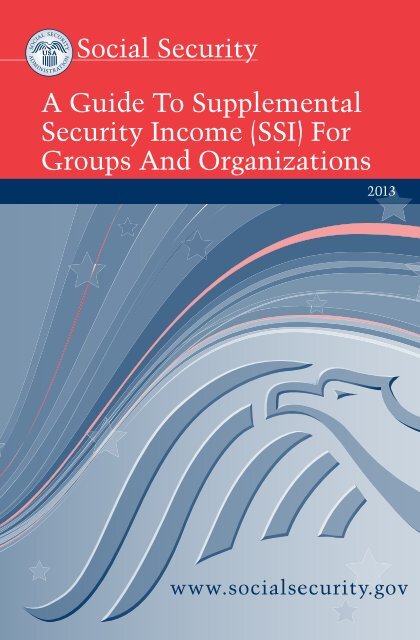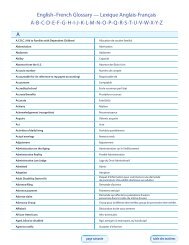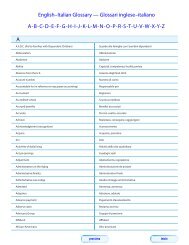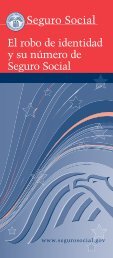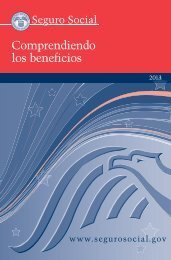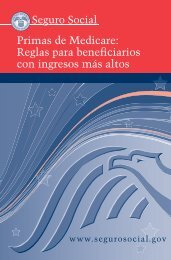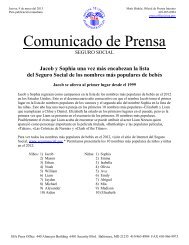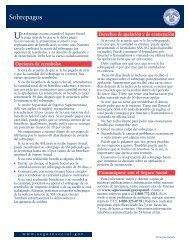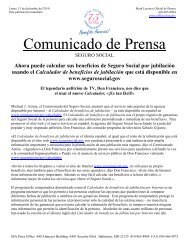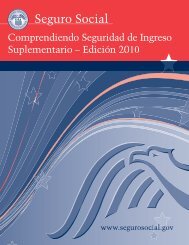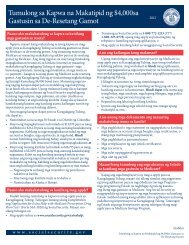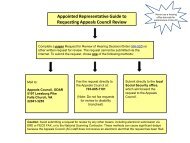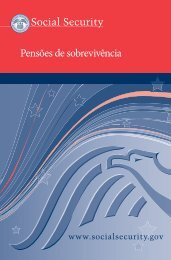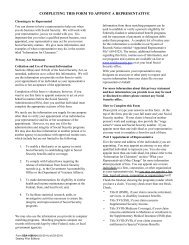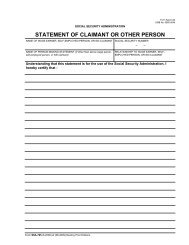A Guide To Supplemental Security Income (SSI ... - Social Security
A Guide To Supplemental Security Income (SSI ... - Social Security
A Guide To Supplemental Security Income (SSI ... - Social Security
You also want an ePaper? Increase the reach of your titles
YUMPU automatically turns print PDFs into web optimized ePapers that Google loves.
A <strong>Guide</strong> <strong>To</strong> <strong>Supplemental</strong><br />
<strong>Security</strong> <strong>Income</strong> (<strong>SSI</strong>) For<br />
Groups And Organizations 2013
Contact <strong>Social</strong> <strong>Security</strong><br />
Visit our website<br />
Our website, www.socialsecurity.gov, is a<br />
valuable resource for information about all of <strong>Social</strong><br />
<strong>Security</strong>’s programs. At our website you also can:<br />
• Apply for retirement, disability, and Medicare benefits;<br />
• Review your <strong>Social</strong> <strong>Security</strong> Statement;<br />
• Get the address of your local <strong>Social</strong> <strong>Security</strong> office;<br />
• Request a replacement Medicare card; and<br />
• Find copies of our publications.<br />
Call our toll-free number<br />
In addition to using our website, you can call us tollfree<br />
at 1-800-772-1213. We treat all calls confidentially.<br />
We can answer specific questions from 7 a.m. to 7<br />
p.m., Monday through Friday. Generally, you’ll have<br />
a shorter wait time if you call during the week after<br />
Tuesday. We can provide information by automated<br />
phone service 24 hours a day. You can use our<br />
automated response system to tell us a new address or<br />
request a replacement Medicare card. If you are deaf<br />
or hard of hearing, you may call our TTY number,<br />
1-800-325-0778.<br />
We also want to make sure you receive accurate and<br />
courteous service. That is why we have a second <strong>Social</strong><br />
<strong>Security</strong> representative monitor some telephone calls.
What’s inside<br />
A guide to <strong>Supplemental</strong> <strong>Security</strong><br />
<strong>Income</strong> (<strong>SSI</strong>) for groups and organizations . . .4<br />
About this booklet . . . . . . . . . . . . . . . . . . . . . . .4<br />
How groups and organizations can help . . . . .5<br />
<strong>SSI</strong> payments and state services . . . . . . . . . . .7<br />
Who is eligible for <strong>SSI</strong>? . . . . . . . . . . . . . . . . . .11<br />
Information for people who get<br />
or apply for <strong>SSI</strong> . . . . . . . . . . . . . . . . . . . . . . . . .21<br />
Helping people who get <strong>SSI</strong><br />
go back to work . . . . . . . . . . . . . . . . . . . . . . . .25
4<br />
A guide to <strong>Supplemental</strong> <strong>Security</strong> <strong>Income</strong><br />
(<strong>SSI</strong>) for groups and organizations<br />
More than eight million people currently get monthly<br />
payments from the <strong>Supplemental</strong> <strong>Security</strong> <strong>Income</strong> (<strong>SSI</strong>)<br />
program. There are many other people who may qualify,<br />
but have not applied. You can help us tell elderly, blind<br />
and disabled people who have little income or resources<br />
about <strong>SSI</strong>.<br />
About this booklet<br />
<strong>SSI</strong> is a federal program that gives monthly payments<br />
to people who have low income and few resources and<br />
who are:<br />
• age 65 or older;<br />
• blind; or<br />
• disabled.<br />
This booklet explains the <strong>SSI</strong> program. We designed it<br />
to help institutions, groups and organizations that have<br />
contact with potential or current <strong>SSI</strong> recipients.<br />
The <strong>Social</strong> <strong>Security</strong> Administration runs the <strong>SSI</strong><br />
program. <strong>Social</strong> <strong>Security</strong> decides who is eligible, makes<br />
payments and keeps a master record of recipients. Even<br />
though <strong>Social</strong> <strong>Security</strong> runs the program, <strong>SSI</strong> is not<br />
<strong>Social</strong> <strong>Security</strong>. <strong>SSI</strong> is financed by U.S. Treasury general<br />
funds, not the <strong>Social</strong> <strong>Security</strong> trust funds.<br />
You can find more general descriptions of the<br />
<strong>SSI</strong> program in <strong>Supplemental</strong> <strong>Security</strong> <strong>Income</strong> (<strong>SSI</strong>)<br />
(Publication No. 05-11000) and You May Be Able <strong>To</strong> Get<br />
<strong>Supplemental</strong> <strong>Security</strong> <strong>Income</strong> (<strong>SSI</strong>) (Publication No.<br />
05-11069).
How groups and organizations can help<br />
You can help spread the word about <strong>SSI</strong> to people who<br />
might be able to get payments.<br />
Sometimes people are afraid of dealing with “the<br />
government.” Organizations can help calm these fears<br />
by assisting people as they apply and wait for a decision.<br />
Organizations can provide transportation to interviews<br />
and help people gather information needed to apply (see<br />
pages 21-22) or get medical evidence. You also can help<br />
them complete part of their <strong>SSI</strong> disability application<br />
online at www.socialsecurity.gov. If they receive <strong>SSI</strong><br />
and need proof of their benefits, they can get an instant<br />
benefit verification letter online. For more information,<br />
got to www.socialsecurity.gov/myaccount.<br />
Help the homeless<br />
<strong>SSI</strong> can help a homeless person get housing by<br />
providing monthly payments, but a person does not<br />
need a home to get <strong>SSI</strong>. <strong>Social</strong> <strong>Security</strong> can make<br />
arrangements to give <strong>SSI</strong> payments to the homeless. An<br />
organization can be a mail drop, allowing a homeless<br />
person to pick up important <strong>Social</strong> <strong>Security</strong> information<br />
at the organization’s address.<br />
Be a representative payee<br />
Some people can get <strong>SSI</strong>, but cannot manage their<br />
money. In these cases, a representative payee receives<br />
the <strong>SSI</strong> payments on their behalf. Representative payees<br />
are responsible for using <strong>SSI</strong> payments on behalf of the<br />
recipients to provide for their care and well-being.<br />
Some organizations that serve as payee for five or more<br />
beneficiaries are allowed to charge a fee for their payee<br />
services if <strong>Social</strong> <strong>Security</strong> authorizes it. The allowed<br />
monthly fee is 10 percent of the monthly benefit or $39,<br />
whichever is less. For individuals with a drug or alcohol<br />
addiction, the maximum fee amount is 10 percent of<br />
the monthly benefit or $76, whichever is less. For more<br />
5
6<br />
information about serving as a payee, ask for A <strong>Guide</strong> For<br />
Representative Payees (Publication No. 05-10076).<br />
Pre-release applications<br />
<strong>To</strong> help people make the transition to the community<br />
when they are released from a public or private facility,<br />
such as a prison or mental institution, people can apply<br />
for <strong>SSI</strong> before being released, and an <strong>SSI</strong> payment can<br />
be made soon after release. An institution and <strong>Social</strong><br />
<strong>Security</strong> may establish a pre-release agreement, which<br />
enables <strong>Social</strong> <strong>Security</strong> to work with the institution<br />
to start processing an application for benefits several<br />
months before the person’s scheduled release date.<br />
<strong>SSI</strong> payments while in an institution<br />
Most people who live in a public institution are not<br />
allowed to get a full <strong>SSI</strong> payment. However, a person<br />
may continue to get <strong>SSI</strong> payments during a stay in an<br />
institution under certain conditions.<br />
Institutions and organizations can help people<br />
continue to get their correct <strong>SSI</strong> payment amounts by<br />
telling <strong>Social</strong> <strong>Security</strong> when they enter an institution.<br />
See pages 20-21 for more information on the rules for<br />
receiving <strong>SSI</strong> while in an institution.<br />
Help for low-income Medicare beneficiaries<br />
If a person with low income and few resources is<br />
eligible for Medicare, the state may pay the Medicare<br />
Part B premiums and other out-of-pocket medical<br />
expenses, such as deductibles and coinsurance, through<br />
the Medicare Savings Programs. If the state does pay<br />
the Part B premiums for a Medicare beneficiary, the<br />
person also will be deemed eligible for Extra Help with<br />
Medicare prescription drug coverage. However, only the<br />
state can decide. <strong>To</strong> find out, contact the state medical<br />
assistance (Medicaid) office or local social services office.
<strong>SSI</strong> payments and state services<br />
How we make payments<br />
People who apply for <strong>SSI</strong> must receive payments<br />
electronically. Electronic payments may be made<br />
by direct deposit, the Direct Express ® card program,<br />
or an Electronic Transfer Account. Learn more at<br />
www.GoDirect.org.<br />
<strong>SSI</strong> payment rates<br />
In 2013, the highest federal <strong>SSI</strong> payment is $710 a<br />
month for a person and $1,066 a month for a couple.<br />
States may add money to the federal <strong>SSI</strong> payments.<br />
Some states let the federal government manage the<br />
state supplement. The state pays <strong>Social</strong> <strong>Security</strong> an<br />
administrative fee for this service. If <strong>Social</strong> <strong>Security</strong><br />
administers the state’s supplemental payment, the<br />
recipient receives one check each month for the federal<br />
and state <strong>SSI</strong> benefits combined.<br />
States may change the payment amounts based on<br />
where and with whom people live. Also, some states<br />
disregard additional amounts of income that the<br />
recipient receives monthly. See the chart on the next<br />
page for a list of the maximum payment rates in states<br />
where the federal government manages some or all of<br />
the states’ supplemental categories of benefits.<br />
Some states manage their own supplemental payments.<br />
In those states, people must apply for the supplement<br />
with the state agency. States that manage their own<br />
supplement are Alabama, Alaska, Colorado, Connecticut,<br />
Florida, Georgia, Idaho, Illinois, Indiana, Kansas, Kentucky,<br />
Louisiana, Maine, Maryland, Massachusetts, Minnesota,<br />
Mississippi, Missouri, Nebraska, New Hampshire, New<br />
Mexico, North Carolina, Ohio, Oklahoma, Oregon, South<br />
Carolina, South Dakota, Tennessee, Texas, Virginia,<br />
Washington, Wisconsin and Wyoming.<br />
7
8<br />
Maximum payment for individual/couple<br />
living independently (2013)<br />
State Elderly Blind Disabled<br />
California<br />
$866.40/<br />
$1,462.20<br />
$921.40/<br />
$1,609.20<br />
$866.40/<br />
$1,462.20<br />
Delaware¹ , ²<br />
$710/<br />
$1,066<br />
$710/<br />
$1,066<br />
$710/<br />
$1,066<br />
Hawaii²<br />
$710/<br />
$1,066<br />
$710/<br />
$1,066<br />
$710/<br />
$1,066<br />
Iowa¹ , ²<br />
$710/<br />
$1,066<br />
$710/<br />
$1,066<br />
$710/<br />
$1,066<br />
Michigan¹ , ²<br />
$710/<br />
$1,066<br />
$710/<br />
$1,066<br />
$710/<br />
$1,066<br />
Montana¹ , ²<br />
$710/<br />
$1,066<br />
$710/<br />
$1,066<br />
$710/<br />
$1,066<br />
Nevada<br />
$746.40/<br />
$1,140.46<br />
$819.30/<br />
$1,440.60<br />
$710/<br />
$1,066<br />
New Jersey<br />
$741.25/<br />
$1,091.36<br />
$741.25/<br />
$1,091.36<br />
$741.25/<br />
$1,091.36<br />
New York¹<br />
$797/<br />
$1,170<br />
$797/<br />
$1,170<br />
$797/<br />
$1,170<br />
Pennsylvania¹ , ² $710/<br />
$1,066<br />
$710/<br />
$1,066<br />
$710/<br />
$1,066<br />
Rhode Island¹ , ² $710/<br />
$1,066<br />
$710/<br />
$1,066<br />
$710/<br />
$1,066<br />
Utah<br />
$710/<br />
$1,070.60<br />
$710/<br />
$1,070.60<br />
$710/<br />
$1,070.60<br />
Vermont<br />
$762.04/<br />
$1,164.88<br />
$762.04/<br />
$1,164.88<br />
$762.04/<br />
$1,164.88<br />
Washington,<br />
D.C.¹ , $710/<br />
$710/<br />
$710/<br />
² $1,066 $1,066 $1,066<br />
¹ Supplement administered jointly by federal and state government.<br />
² State pays supplement only when recipient lives in particular<br />
settings—See State Assistance Programs for <strong>SSI</strong> Recipients,<br />
January 2013 (Publication No. 13-11975) for details.
How we figure payment amounts<br />
Before we begin paying someone <strong>SSI</strong>, we will send<br />
him or her a letter that tells when payments start and<br />
how much he or she will get.<br />
We compute the first <strong>SSI</strong> payment from the first full<br />
month after the person applied or became eligible for <strong>SSI</strong>.<br />
The amount due may not be the same every month. The<br />
amount depends on other income and living arrangements.<br />
We will tell the person in advance whenever we change the<br />
amount of the payment.<br />
The federal and state <strong>SSI</strong> payments may increase<br />
to keep up with the cost of living. Normally these<br />
increases will be in the January payment.<br />
When a person becomes eligible again after being<br />
ineligible, a person’s payment sometimes is prorated<br />
from the date the person becomes eligible through the<br />
end of the month. For example, a person who becomes<br />
eligible on the 10th day of the month will get an <strong>SSI</strong><br />
payment based on the number of days from the 10th<br />
through the end of the month. The payment amount is<br />
figured according to the person’s income and where and<br />
with whom he or she lives and is then prorated.<br />
We reduce the base <strong>SSI</strong> payment by one-third if a<br />
person or couple is living in another person’s home and<br />
getting food and shelter from that person. This reduction<br />
takes the place of setting the exact dollar value for<br />
the help. Support is any food or shelter that is given to<br />
someone or is received because someone else pays for it.<br />
State services<br />
In addition to the supplemental payments, the states<br />
may provide people who get <strong>SSI</strong> with Medicaid and<br />
other services.<br />
Interim assistance payments<br />
Some states and local subdivisions make “interim<br />
assistance payments” to people while they wait for a<br />
decision on whether they can get <strong>SSI</strong>. <strong>Social</strong> <strong>Security</strong><br />
9
10<br />
reimburses the state or local government from the<br />
person’s first <strong>SSI</strong> payment.<br />
Medicaid<br />
In most states, people who get <strong>SSI</strong> get Medicaid,<br />
which pays health care expenses.<br />
In some states, Medicaid is available to a disabled<br />
child age 18 or younger who receives home care that<br />
costs the government less than institutional care. If<br />
someone gives away or sells personal items for less<br />
than what they are worth or the person is a beneficiary<br />
of a trust, it may affect Medicaid coverage. For more<br />
information about Medicaid, contact the state medical<br />
assistance (Medicaid) office or local social services office.<br />
<strong>Social</strong> services<br />
People who get <strong>SSI</strong> sometimes can get social services<br />
from the state, city or county. Depending on where the<br />
person lives, these may include homemaker services<br />
and arrangements for meals or transportation. More<br />
information is available at the local public assistance<br />
office or social services department.<br />
<strong>Supplemental</strong> Nutrition Assistance<br />
Program (food stamps)<br />
People who get <strong>SSI</strong> might be able to get help through<br />
the <strong>Supplemental</strong> Nutrition Assistance Program (SNAP),<br />
formerly known as food stamps. In households where<br />
everyone is applying for or getting <strong>SSI</strong>, people can apply<br />
for SNAP at a <strong>Social</strong> <strong>Security</strong> office.<br />
People who do not live in a home where<br />
everyone is applying for or getting <strong>SSI</strong> can visit<br />
www.fns.usda.gov/snap to find out how to<br />
apply. For more information, ask for Nutrition<br />
Assistance Programs (Publication No. 05-10100).
Who is eligible for <strong>SSI</strong>?<br />
Who can get <strong>SSI</strong>?<br />
People with low income and few resources (things<br />
owned) who are age 65 or older or are blind or have a<br />
disability may be able to get <strong>SSI</strong>. Other requirements are<br />
on page 19.<br />
We consider people age 18 or older “disabled” if they<br />
have a physical or mental condition (or combination<br />
of conditions) that keeps them from working and the<br />
condition is expected to last at least 12 months or result<br />
in death.<br />
We consider a child younger than age 18 “disabled”<br />
if the child has a physical or mental condition<br />
(or combination of conditions) that results in<br />
“marked and severe functional limitations” and<br />
the condition is expected to last at least 12 months<br />
or result in death. For more information about<br />
benefits for children, ask for Benefits For Children<br />
With Disabilities (Publication No. 05-10026).<br />
We consider a person “blind” if he or she has vision no<br />
better than 20/200 or a limited visual field of 20 degrees<br />
or less in the better eye with the use of eyeglasses. A<br />
person whose sight is not poor enough to be considered<br />
blind may still qualify as disabled.<br />
What is income?<br />
<strong>SSI</strong> considers “income” anything a person receives that<br />
can be used for food or shelter. <strong>Income</strong> includes cash,<br />
checks and “gift” items received, such as food and shelter.<br />
<strong>SSI</strong> divides income into two categories—earned and<br />
unearned. Earned income includes wages, net earnings<br />
from self-employment, certain royalties and money from<br />
sheltered workshops. Unearned income includes <strong>Social</strong><br />
<strong>Security</strong> benefits, workers’ or veteran’s compensation,<br />
pensions, support and maintenance in kind, annuities,<br />
rent and other income not earned.<br />
11
12<br />
In 2013, a person must have less than $730 a month<br />
in unearned income to receive <strong>SSI</strong> benefits. A couple can<br />
get <strong>SSI</strong> if they have unearned income of less than $1,086<br />
a month in 2013.<br />
Because a larger portion of earned income is<br />
disregarded, a person who receives <strong>SSI</strong> can earn up to<br />
$1,505 a month ($2,217 for a couple) and still continue<br />
receiving <strong>SSI</strong>.<br />
While we encourage people who already receive <strong>SSI</strong><br />
benefits to work, people who work while applying for<br />
<strong>SSI</strong> benefits based on disability cannot make as much<br />
in earned income. That’s because their ability to work<br />
affects our disability decision. A person who is not blind<br />
and is just now applying for <strong>SSI</strong> disability benefits and<br />
earns more than $1,040 a month probably will not be<br />
able to get <strong>SSI</strong> benefits.<br />
People who live in a state that adds money to the<br />
federal payment can get <strong>SSI</strong> even if they have more<br />
income (see the chart on page 8).<br />
<strong>Income</strong> lowers the amount of an <strong>SSI</strong> payment.<br />
However not everything a person gets is income, and<br />
some things that are income do not count.<br />
What does not count as income?<br />
• Medical care and services (including reimbursements<br />
and payment of health insurance premiums by others);<br />
• <strong>Social</strong> services;<br />
• <strong>Income</strong> from the sale, exchange or replacement of<br />
resources (these are considered resources);<br />
• <strong>Income</strong> tax refunds;<br />
• Insurance on charge accounts or other credit accounts;<br />
• Proceeds of a bona fide loan;<br />
• Bills paid by someone else for things other than food<br />
or shelter;<br />
• Replacement of lost or stolen income;<br />
• Home energy assistance;
• $20 a month of earned or unearned income (except<br />
some types of unearned income based on need, such as<br />
certain veterans’ pensions);<br />
• $65 a month of earned income plus one-half of earned<br />
income over $65 a month or, if there is no unearned<br />
income, $85 a month of earned income plus one-half of<br />
the rest;<br />
• <strong>Supplemental</strong> Nutrition Assistance Program (SNAP),<br />
formerly known as food stamp assistance;<br />
• Government refunds of taxes paid on real property or<br />
on food purchases;<br />
• Assistance based on need from a state or local political<br />
subdivision or Indian tribe;<br />
• Amounts for tuition and fees paid from<br />
grants, scholarships, fellowships and gifts for<br />
educational expenses;<br />
• Home-grown produce consumed by the household;<br />
• Irregular or infrequent earned income totaling no more<br />
than $30 a quarter;<br />
• Irregular or infrequent unearned income totaling no<br />
more than $60 a quarter;<br />
• Domestic commercial transportation tickets received<br />
as gifts and used;<br />
• Payments for giving foster care to a child who is not<br />
getting <strong>SSI</strong>, but has been placed by an approved agency<br />
in the home of someone who gets <strong>SSI</strong>;<br />
• One-third of any child support payments from the<br />
absent parent if you are a child;<br />
• Earnings (up to $1,730 a month, but no more than<br />
$6,960 a year in 2013) of a person younger than age 22<br />
who regularly attends school or a training program;<br />
• Grants or loans to students from the Department<br />
of Education’s or Bureau of Indian Affairs’<br />
educational programs;<br />
13
14<br />
• <strong>Income</strong> needed by a blind or disabled person for an<br />
approved “plan to achieve self-support” (see page 27);<br />
• The cost of a blind person’s work expenses;<br />
• Earned income used to pay for items or services that<br />
help a disabled person work (see page 26);<br />
• Housing assistance from most federal housing programs;<br />
• Compensation to volunteers from the Corporation<br />
for National and Community Service (formerly<br />
known as ACTION) programs run by state and<br />
local subdivisions;<br />
• Restitution payments made by the U.S. government to<br />
Japanese-Americans and Aleuts who were interned or<br />
relocated during World War II;<br />
• Payments made by the Austrian government under<br />
paragraphs 500-506 of the Austrian General <strong>Social</strong><br />
Insurance Act;<br />
• Agent Orange settlement payments;<br />
• Reparations payments received by Holocaust survivors<br />
from the Federal Republic of Germany;<br />
• Earned income tax credit payments and child tax<br />
credit payments;<br />
• Netherlands WUV payments to victims of persecution<br />
during the German and Japanese occupations of the<br />
Netherlands and the Dutch East Indies;<br />
• Relocation assistance provided for federal or federally<br />
assisted projects or by state or local governments;<br />
• Assistance furnished in connection with a<br />
presidentially declared disaster and any interest earned<br />
on the assistance;<br />
• Most federal judgment distribution payments and per<br />
capita payments of funds held in trust by the Secretary<br />
of the Interior made to members of Native American<br />
tribes, including purchases made with such payments;<br />
• Up to $2,000 annually of income that Native<br />
Americans get from their interests in trust or<br />
restricted Indian lands;
• Interest which is paid on excluded burial funds and left<br />
to accumulate;<br />
• Any interest earned and left to accumulate as part of the<br />
value of an excluded burial space purchase agreement;<br />
• Interest and dividends earned on other resources, in<br />
many cases;<br />
• Food, clothing, or shelter in a nonprofit retirement<br />
home or similar institution that is provided or paid<br />
for by a nonprofit organization that is not expressly<br />
obligated to do so;<br />
• Food, clothing, shelter and home energy assistance<br />
provided by a private nonprofit organization if the<br />
assistance is based on need as certified by the state;<br />
• Home energy assistance provided by certain home<br />
energy suppliers if the assistance is based on need and<br />
is certified by the state;<br />
• Settlement payments to eligible American Indian<br />
landowners whose assets had been mismanaged by<br />
the United States;<br />
• The first $2,000 of compensation received per calendar<br />
year for participating in certain clinical trials;<br />
• Victims’ compensation payments;<br />
• State annuities for certain veterans;<br />
• Hostile fire and imminent danger pay from the<br />
Uniformed Services;<br />
• AmeriCorps and National Civilian Community Corps<br />
(NCCC) payments;<br />
• Payments from the Radiation Exposure Compensation<br />
trust fund; and<br />
• Funds received by American Indians from the Claims<br />
Resolution Act of 2010 (Cobell v. Salazar).<br />
Other income rules<br />
If only one member of a couple qualifies for <strong>SSI</strong>, part<br />
of the ineligible member’s income may be considered the<br />
eligible spouse’s as well.<br />
15
16<br />
If an eligible couple separates, <strong>Social</strong> <strong>Security</strong> treats<br />
each person as an individual starting with the first<br />
month after they separate.<br />
If an unmarried child under age 18 is living at home,<br />
<strong>Social</strong> <strong>Security</strong> may consider some of the parents’<br />
income as the child’s income. We make allowances for<br />
the parents and for other children living in the home<br />
when we consider the parents’ income. The remaining<br />
parental income is included with the child’s to decide if<br />
the child can get <strong>SSI</strong>.<br />
Monthly wage reporting<br />
If an <strong>SSI</strong> recipient works, or somebody in the<br />
household whose income may affect the recipient works<br />
(see “Other income rules”), we strongly encourage<br />
monthly wage reporting as a way to make sure <strong>SSI</strong><br />
payments are accurate and on time. Most people with<br />
telephone access can report wages using our automated<br />
phone system. Contact your local <strong>Social</strong> <strong>Security</strong> office<br />
to learn more. Because it is the responsibility of the<br />
beneficiary or payee to report wages, not reporting them<br />
on time may result in the <strong>SSI</strong> recipient owing money<br />
to <strong>Social</strong> <strong>Security</strong>. Submitting pay stubs on time every<br />
month will ensure accurate and timely <strong>SSI</strong> payments.<br />
Temporary Assistance for Needy Families<br />
The <strong>SSI</strong> program allows a person to get both <strong>SSI</strong><br />
and Temporary Assistance for Needy Families (TANF)<br />
payments, but TANF is considered income for <strong>SSI</strong><br />
purposes. However, most states will not pay TANF<br />
to <strong>SSI</strong> recipients. Check with the TANF agency in<br />
your state.<br />
Resources (things a person owns)<br />
For a person to get <strong>SSI</strong>, the resources, or things a<br />
person owns, must be worth no more than $2,000; a<br />
couple’s resources can be worth up to $3,000.
The higher limit applies to a couple even if only one<br />
member can get <strong>SSI</strong>. <strong>Social</strong> <strong>Security</strong> counts the couple’s<br />
resources as if both members were eligible.<br />
If an eligible couple separates, <strong>Social</strong> <strong>Security</strong> will<br />
treat each member of the couple as an individual<br />
starting with the first month after they separate.<br />
If an unmarried child under age 18 is living at home<br />
and the parents’ resources exceed $3,000 ($2,000 if only<br />
one parent), the excess may be considered the child’s.<br />
<strong>Social</strong> <strong>Security</strong> considers money, whether in cash<br />
or an account, as a resource in the month after it is<br />
received in most cases. Sometimes money does not<br />
count as a resource for a limited period of time but then<br />
becomes a countable resource if it is not spent within<br />
the given time limit.<br />
In some cases, a person may receive money that<br />
does not count as income when received but does count<br />
as a resource after received. The next section gives some<br />
examples.<br />
What resources do not count?<br />
We do not count everything a person owns when we<br />
decide whether a person can get <strong>SSI</strong>. For example, we do<br />
not count the following:<br />
• A home (and adjacent land) where a person lives;<br />
• Household goods or personal effects do not usually<br />
count as resources. However, personal property<br />
acquired or held because of its value or as an<br />
investment may be considered a countable resource.<br />
• One car, usually;<br />
• Life insurance policies with a total face value of $1,500<br />
or less per person;<br />
• Burial plots or spaces for a person and immediate family;<br />
• Burial funds of up to $1,500 per person for a person and<br />
spouse if specifically set aside for burial. This amount<br />
will be reduced by the amount of any life insurance<br />
policy;<br />
17
18<br />
• Property needed for a person’s self-support. This<br />
includes property used in a trade or business or by<br />
the individual as an employee, non-business incomeproducing<br />
property and property used to produce<br />
essential goods and services (like rental property or<br />
land used to produce food for home consumption);<br />
• Things that a person who is blind or disabled needs<br />
for an approved “plan to achieve self-support”<br />
(see page 27);<br />
• Disaster assistance and certain native corporation<br />
stocks held by natives of Alaska;<br />
• Any retroactive <strong>SSI</strong> payments or retroactive <strong>Social</strong><br />
<strong>Security</strong> payments are not counted as resources for<br />
nine months after they are received. This gives time<br />
to make purchases or payments on debts that went<br />
unpaid while waiting for the back payments. Any<br />
retroactive payments left after nine months will count<br />
as a resource;<br />
• Crime victims’ compensation payments for nine<br />
months after they are received;<br />
• Grants, scholarships, fellowships and gifts for tuition<br />
and fees paid for education expenses for nine months<br />
after the month they are received;<br />
• State and local government relocation assistance for<br />
nine months after it is received; and<br />
• All federal tax refunds and advanced tax credits are<br />
excluded for 12 months following the month they<br />
are received.<br />
Other rules about resources<br />
A person who owns more than is allowed because of<br />
property that cannot be sold quickly may still be able<br />
to get <strong>SSI</strong> payments by signing an agreement to sell the<br />
excess resources.<br />
If a person gives away or sells a resource for less than<br />
it is worth, there may be a period of ineligibility for <strong>SSI</strong>.
The gift or sale also may make him or her ineligible for<br />
Medicaid coverage of nursing home and other services.<br />
Shared resources and income<br />
The federal law does not require support by relatives.<br />
But, in deciding whether someone can get <strong>SSI</strong>, we<br />
consider a husband and wife who live together to be<br />
sharing their income and resources, and a child to be<br />
sharing their parents’ income and resources.<br />
Other rules<br />
In addition to being age 65 or older, blind or disabled<br />
and meeting the limits on income and resources, a<br />
person must meet other requirements to qualify for<br />
<strong>SSI</strong>. Generally, you need to be a United States citizen to<br />
receive <strong>SSI</strong>, but there are some exceptions.<br />
An applicant must also give <strong>Social</strong> <strong>Security</strong><br />
permission to contact any financial institution and<br />
request any financial records that a financial institution<br />
may have about them.<br />
Residence and citizenship<br />
<strong>To</strong> get <strong>SSI</strong>, a person must live in the United States or the<br />
Northern Mariana Islands (except for children of military<br />
personnel and students temporarily abroad). U.S. citizens<br />
and nationals can get <strong>SSI</strong>, and sometimes noncitizens<br />
who are lawfully residing in the United States. For more<br />
information, ask for <strong>Supplemental</strong> <strong>Security</strong> <strong>Income</strong> (<strong>SSI</strong>)<br />
For Noncitizens (Publication No. 05-11051).<br />
Sponsored noncitizens<br />
Whether a sponsored noncitizen can get <strong>SSI</strong> depends<br />
on the income and resources of the sponsor, the<br />
sponsor’s spouse and on the noncitizen’s own resources<br />
and income. The resources and income of the sponsor<br />
(and the sponsor’s spouse) are considered to be the<br />
noncitizen’s and are counted when deciding whether the<br />
noncitizen can get <strong>SSI</strong> and the amount of payment.<br />
19
20<br />
For noncitizens whose sponsors signed legally<br />
enforceable affidavits of support on December 19, 1997,<br />
or later, the sponsor’s income and resources may be<br />
counted until the noncitizen becomes a U.S. citizen or<br />
works 10 years. Contact us for more information about<br />
sponsor income.<br />
Leaving the United States<br />
People who leave the 50 states, the District of Columbia,<br />
or the Northern Mariana Islands for an entire calendar<br />
month can’t receive payment for that month. For <strong>SSI</strong><br />
purposes, Puerto Rico is considered to be outside the<br />
United States and people who move to Puerto Rico<br />
cannot get <strong>SSI</strong> .<br />
Also, after a person has been outside the country for<br />
30 or more days in a row, payments cannot start again<br />
until the person has been back in the United States or<br />
the Northern Mariana Islands for 30 days in a row. If a<br />
person is out of the country for less than a month, there<br />
is no change in the <strong>SSI</strong> payment.<br />
There are special rules for dependent children of<br />
military personnel who leave the United States. They<br />
may be able to get or apply for <strong>SSI</strong> while overseas. There<br />
are also exceptions for students studying abroad.<br />
Applying for other benefits<br />
People who get or apply for <strong>SSI</strong> must apply for any<br />
other cash benefits they might be able to get. People who<br />
get <strong>SSI</strong> might be able to get <strong>Social</strong> <strong>Security</strong>, too.<br />
People in institutions<br />
People who live in city or county rest homes, halfway<br />
houses, prisons or other public institutions usually<br />
cannot get <strong>SSI</strong>. There are exceptions to this rule:<br />
• A person who lives in a publicly operated community<br />
residence that serves no more than 16 people may be<br />
able to get <strong>SSI</strong>.
• A person who lives in a public institution primarily<br />
to attend approved educational or vocational training<br />
provided in the institution may be able to get <strong>SSI</strong><br />
if the training is designed to prepare the person for<br />
employment.<br />
• If a person is in a public or private medical treatment<br />
facility and Medicaid is paying more than half the cost<br />
of his or her care, the person may be able to get <strong>SSI</strong>. A<br />
child in a public or private medical treatment facility<br />
may be able to get <strong>SSI</strong> if Medicaid or private insurance<br />
is paying more than half the cost of care. In these<br />
cases, the <strong>SSI</strong> payment is usually no more than $30 a<br />
month, plus any additional money paid by the state.<br />
• A person who lives in a public emergency shelter for<br />
the homeless can get <strong>SSI</strong> for up to six months during<br />
any nine-month period.<br />
• Some people who get <strong>SSI</strong> and who were working before<br />
entering an institution may be able to keep getting <strong>SSI</strong><br />
for the first two full months in the institution.<br />
• A person who gets <strong>SSI</strong> may be able to keep getting it<br />
for up to three months during a temporary stay in a<br />
medical institution if:<br />
—A doctor certifies that the person is expected to be<br />
in the institution three months or less; and<br />
—The person maintains and pays expenses associated<br />
with permanent living expenses.<br />
We must have evidence of the temporary stay by the<br />
90th day after the person enters the institution or by<br />
the date of discharge, whichever is earlier.<br />
Information for people who get or apply for <strong>SSI</strong><br />
Applying for <strong>SSI</strong><br />
People can apply for <strong>SSI</strong> by visiting a <strong>Social</strong> <strong>Security</strong><br />
office or calling us for an appointment. Additionally, it<br />
is possible to complete a large part of an application for<br />
<strong>SSI</strong> disability benefits online at www.socialsecurity.gov.<br />
21
22<br />
Parents or guardians usually can apply for a child under<br />
age 18. It is helpful to have the following information<br />
before applying:<br />
• <strong>Social</strong> <strong>Security</strong> card or number;<br />
• Birth certificate or other proof of age;<br />
• Home information, such as a mortgage receipt or lease<br />
and landlord’s name;<br />
• Payroll slips, bank books, insurance policies, car<br />
registration, burial fund records, and other information<br />
about income and resources;<br />
• Names, addresses, and telephone numbers of doctors,<br />
hospitals and clinics (if applying due to disability or<br />
blindness); and<br />
• Proof of U.S. citizenship or noncitizen status.<br />
People should apply even if they do not have all the<br />
things listed. We can help them get what is needed.<br />
How we handle <strong>SSI</strong> applications<br />
The <strong>Social</strong> <strong>Security</strong> office takes applications and<br />
evaluates evidence of identity, income and resources.<br />
The office determines if a representative payee is needed<br />
and, if so, appoints one.<br />
If the person applying seems to meet all the requirements<br />
and needs money right away due to an emergency,<br />
the <strong>Social</strong> <strong>Security</strong> office may issue an emergency<br />
advance payment. Usually we collect the amount of the<br />
advance payment from the <strong>SSI</strong> backpay or the first six<br />
<strong>SSI</strong> payments. If, however, the person is not eligible for<br />
benefits, the advance payment may have to be repaid.<br />
For a person age 65 or older, the <strong>Social</strong> <strong>Security</strong> office<br />
decides if he or she will get <strong>SSI</strong>.<br />
For a disabled or blind claimant getting <strong>Social</strong> <strong>Security</strong><br />
disability benefits, the <strong>Social</strong> <strong>Security</strong> office may make<br />
the <strong>SSI</strong> decision without a formal medical decision.<br />
For a disabled or blind claimant not getting <strong>Social</strong><br />
<strong>Security</strong> disability benefits, a formal medical decision is<br />
needed. It is made by the state disability determination
service. The state agency reviews all medical evidence<br />
submitted and requests additional evidence if needed.<br />
A person applying for <strong>SSI</strong> who has a very severe<br />
disability may be found “presumptively disabled” or<br />
“presumptively blind” and can get payments for up to six<br />
months while the state agency determines if the person is<br />
disabled or blind. These payments will not have to be paid<br />
back if the claimant is found not to be disabled or blind.<br />
What to report<br />
A person who gets <strong>SSI</strong> (or his or her representative payee)<br />
must report all changes that might affect eligibility or<br />
payment. A change should be reported within 10 days after<br />
the month in which it occurs.<br />
NOTE: If people do not report changes to us in a<br />
timely way, they can be penalized. With a penalty, they<br />
can lose money from their payment. This amount is<br />
from $25 up to $100. If we find out that people gave us<br />
false information or withheld important information on<br />
purpose, we can stop their benefits from six to 24 months.<br />
People who get <strong>SSI</strong> must report:<br />
• Changes in income, resources, living arrangements,<br />
name and marital status;<br />
• If they start or stop work;<br />
• If they enter or leave an institution;<br />
• If their address changes;<br />
• If their condition improves;<br />
• If they leave the United States or the Northern<br />
Mariana Islands (Puerto Rico is considered outside the<br />
United States for <strong>SSI</strong> purposes only, and people who<br />
move to Puerto Rico are ineligible for <strong>SSI</strong>); and<br />
• If they have an unsatisfied arrest warrant for flight<br />
to avoid prosecution or confinement, escape from<br />
custody and flight-escape, or are violating a condition<br />
of probation or parole imposed under state or federal<br />
law. However, we no longer suspend or deny payments<br />
23
24<br />
based solely on an outstanding warrant for a violation of<br />
probation or parole.<br />
Married people who get <strong>SSI</strong> must report changes in<br />
their spouse’s income and resources.<br />
If the person getting <strong>SSI</strong> is a child younger than age 18<br />
living with his or her parents, any change in the parents’<br />
income and resources must be reported.<br />
People getting <strong>SSI</strong> who are blind or have a disability<br />
must let <strong>Social</strong> <strong>Security</strong> know if they go to work,<br />
become self-employed or their condition improves.<br />
Students between ages 18 and 22 must report if they<br />
start or stop going to school.<br />
The income of children who do not get <strong>SSI</strong> may<br />
affect the amount of <strong>SSI</strong> payable to their parents or to<br />
a sibling getting <strong>SSI</strong>. Recipients must report changes<br />
in the income of children who live in their household.<br />
They must also report changes in the school attendance<br />
of children ages 18-22 and tell us when a child in the<br />
household reaches age 18 (or age 22 if a student).<br />
If a noncitizen has a sponsor, the <strong>SSI</strong> recipient must<br />
report changes in the income and resources of the<br />
sponsor and the sponsor’s spouse.<br />
Someone should notify us if a person who gets <strong>SSI</strong><br />
cannot manage money or dies. Reports can be made by<br />
phone, mail or in person at any <strong>Social</strong> <strong>Security</strong> office.<br />
<strong>Social</strong> <strong>Security</strong> gives detailed reporting responsibilities<br />
to people who get or apply for <strong>SSI</strong>. For additional<br />
information please see What You Need <strong>To</strong> Know<br />
When You Get <strong>Supplemental</strong> <strong>Security</strong> <strong>Income</strong> (<strong>SSI</strong>)<br />
(Publication No. 05-11011).<br />
Right to appeal<br />
A person has the right to appeal a decision made<br />
about his or her <strong>SSI</strong> (except some state decisions).<br />
If a person disagrees with the decision, he or she<br />
has 60 days to appeal. For more information, ask<br />
for Your Right <strong>To</strong> Question A Decision Made On
Your <strong>Supplemental</strong> <strong>Security</strong> <strong>Income</strong> (<strong>SSI</strong>) Claim<br />
(Publication No. 05-11008).<br />
<strong>SSI</strong> reviews<br />
The law requires that we regularly review the case<br />
of each person getting <strong>SSI</strong>. This review is called a<br />
“redetermination.”<br />
We will ask the person getting <strong>SSI</strong> to provide<br />
information about income, resources, bank accounts and<br />
where and with whom he or she lives. It is a good idea<br />
to keep bank account statements because they may be<br />
needed for the redetermination.<br />
In some cases, we can do the redetermination by mail<br />
or telephone. In other cases, we will ask the person to<br />
visit the <strong>Social</strong> <strong>Security</strong> office for an interview. Local<br />
<strong>Social</strong> <strong>Security</strong> offices notify the person when it is time<br />
for his or her redetermination.<br />
Medical reviews<br />
We review disability cases to be sure the person is still<br />
disabled. We may ask for new medical evidence and ask<br />
the person to have special exams or tests. The frequency<br />
of these medical reviews depends on how severe the<br />
impairment is and whether medical improvement is<br />
expected. A person whose medical condition is expected<br />
to improve usually has his or her case reviewed six to 18<br />
months after payments start.<br />
Helping people who get <strong>SSI</strong> go back to work<br />
There are a variety of rules to encourage people who<br />
are blind or who have a disability to work. For more<br />
detailed information, ask for Working While Disabled—<br />
How We Can Help (Publication No. 05-10095).<br />
Ticket to Work<br />
Most people who get <strong>SSI</strong> because they are disabled or<br />
blind can use a “ticket” for vocational rehabilitation and<br />
other employment support services from an approved<br />
25
26<br />
provider of their choice. A person in the program<br />
generally will not need to have a regularly scheduled<br />
medical review. For more information, ask for Your Ticket<br />
<strong>To</strong> Work (Publication No. 05-10061).<br />
Deductions for work expenses<br />
In deciding whether a person who is disabled can get<br />
<strong>SSI</strong> and in figuring the <strong>SSI</strong> payment amount, we can<br />
deduct some impairment-related work expenses from<br />
your earned income. <strong>Social</strong> <strong>Security</strong> must approve each<br />
deduction and the amount. The following work expenses<br />
usually are deductible:<br />
• Wheelchairs, respirators, braces and other medical<br />
devices;<br />
• Attendant care services, such as assistance going to<br />
and from work or an interpreter for the deaf;<br />
• One-handed typewriters, telecommunications devices<br />
for the deaf and other work-related equipment;<br />
• Regularly prescribed drugs and medical services<br />
needed to control a medical condition;<br />
• Home modifications, such as ramps or railings outside<br />
the home that improve mobility; and<br />
• Expendable medical supplies and other miscellaneous<br />
expenses.<br />
Blind people who get <strong>SSI</strong> are allowed deductions from<br />
their earned income for work expenses in addition to<br />
those mentioned above. Examples are federal, state<br />
and <strong>Social</strong> <strong>Security</strong> taxes; guide dog expenses; routine<br />
transportation costs to and from work; and union dues.<br />
These work expenses will be deducted before figuring a<br />
blind recipient’s <strong>SSI</strong> eligibility or payment amount.<br />
Continuation of payments and Medicaid<br />
<strong>SSI</strong> payments may be paid to disabled persons even if<br />
they work. As earnings increase, the amount of the <strong>SSI</strong>
payment is reduced. Even if a person’s cash payments<br />
stop because of wages, the person may be able to keep<br />
Medicaid coverage.<br />
Plan to achieve self-support<br />
Under a plan to achieve self-support, a person who is<br />
disabled or blind can set aside income and resources for<br />
a work goal. The individual must use the funds to pay<br />
for things needed to reach the goal, such as vocational<br />
training, education, purchasing work-related equipment,<br />
or starting a business. The funds set aside will not count<br />
in deciding whether a person can get <strong>SSI</strong> or how much<br />
he or she can receive.<br />
The person must have a realistic work goal, a specific<br />
savings or spending plan, and must account for the<br />
money that is set aside. The person must follow the<br />
plan, but can negotiate revisions if needed.<br />
A vocational counselor, social worker, employer, <strong>Social</strong><br />
<strong>Security</strong> representative, or anyone else may help a person<br />
develop this plan. <strong>Social</strong> <strong>Security</strong> will evaluate the plan<br />
and decide if it is acceptable.<br />
It is important to remember that a person who<br />
currently does not have a plan may set realistic goals to<br />
become self-supporting. He or she may create a plan for<br />
achieving self-support to move toward those goals.<br />
Quick benefit restart<br />
A person who returns to work but finds within five<br />
years that he or she cannot continue to work because<br />
of a disability can have benefits restarted without filing<br />
a new application. A person can get up to six months<br />
of provisional payments while we verify a disability<br />
still exists.<br />
If we find that the person is still disabled, regular <strong>SSI</strong><br />
payments will start if all other requirements are met.<br />
If <strong>Social</strong> <strong>Security</strong> later finds that the person is not<br />
disabled, these provisional payments usually do not need<br />
to be paid back.<br />
27
<strong>Social</strong> <strong>Security</strong> Administration<br />
SSA Publication No. 05-11015<br />
ICN 480300<br />
Unit of Issue - Package of 25<br />
March 2013 (Recycle prior editions)<br />
Printed on recycled paper


